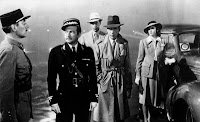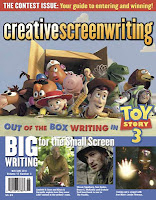As I see it, all these rules about headers and sluglines are just as arbitrary as spelling and grammar. If I must format something, I like to use classic screenplays from the ‘40s and ‘50s as my guideline. After all, if that page layout was good enough for Casablanca it’s good enough for people today.
Category: rules
February 23, 2013 / 2 Comments
How To Lose A Screenplay Contest
January 4, 2013
Mission Statement
None of that here.
More to the point, people eventually started to pay me for my writing. It’s not the only yardstick for success, granted, but I think we can all agree it’s the one that’s universally accepted and pretty much always has been. My ability to write got me a job as an entertainment journalist. I sold short stories to journals and anthologies. I’ve sold half a dozen books to Permuted Press, and later to Crown Publishing, a division of Random House—and some of those books have sold very, very well and received a lot of praise (okay, so there’s a little self-promotion). Amazon Studios hired me to develop a screenplay idea for them and write up a treatment. For the past six years, I’ve supported myself by stringing words together in a way that pleased people enough that they paid me to keep doing it.
January 5, 2012 / 4 Comments
Why Are We Here?
And I’m going under the general assumption that if you’ve slogged through all this, you’ve got at least a basic grasp of this writing thing and are hoping to go further with it. Perhaps even make a few dollars with it. And if any of you have a specific question or topic you’d like me to prattle on about, let me know.
January 15, 2010 / 1 Comment
The Golden Rule
Just to be clear up front, this is not about doing unto others. Sorry.
When I started this blog way, way back in the dusty year of 2007, there wasn’t much to it. To be honest, it really started as a column I was pitching to one of the editors at Creative Screenwriting. If you look back at some of those early posts you can still see that more formal edge to them. Anyway, I pitched the idea and a few sample columns to one editor, then to the editor that replaced him, and then casually to the publisher once at a party. Then I said screw it and tossed them up at Blogspot under the best name I could come up with in fifteen seconds. Where they sat for many months until I decided I wanted to spew about something else I was seeing new writers doing. I think I’d just finished reading for a screenwriting contest and was just baffled how so many people could keep making the same mistakes again and again.
It was also about the time I was giving up crew work in the film industry to start writing full time. It meant I was browsing a lot of other blogs and message boards. It struck me that while there were all-too-many folks offering “useful advice” about getting an agent, submission formats, publishing contracts, and so on, there were very few that offered any help with writing. Which seems kind off bass-ackward, as old folks say to young folks. Also, the few folks that were speaking about writing tended to do so with absolute certainty, despite a lack of credentials of any sort whatsoever. Worse still, a huge number of people were blindly following those folks and their bizarre “rules” of writing..
Now, I did lots of writing stuff as a teenager, but it wasn’t until college that I discovered how many markets there were, and how many magazines devoted to the craft of writing. Again, old fashioned as it may make me sound (granted, there was a different guy named Bush in the White House then), this pile of magazines did something the internet doesn’t. It actually forced me to learn the material rather than just plopping it in front of me. I had to search every article, every column, and read through them in their entirety hoping to find a hint or tip on how to improve my writing skills.
One thing that became apparent pretty quick, even to not-yet-legal-to-drink me, was that a lot of these tips contradicted each other. Here’s an article about how you should write eight hours a day, but this one says four, and that one says don’t write unless you’re inspired. She says to outline and plot out everything, he says to just go with the flow and see what happens. One columnist suggests saving money by not asking for your submission back, but another writer points out that this creates the instant mental image that your manuscript is disposable.
Y’see, Timmy, if you ask twenty different novelists how they create a character, you’re going to get twenty different answers. If you ask twenty screenwriters how they write a scene, you’re going to get twenty different answers. And all of these answers are valid, because all of these methods and tricks work for that writer.
Which is the real point of the ranty blog. I want to offer folks some of the tips and ideas I sifted out of all those articles and columns, along with some I’ve developed on my own after trying (and failing and trying again) to write a hundred or so short stories, scripts, and novels.
To be blunt, I don’t expect anyone to follow the tips and rules here letter for letter. Heck, as I’ve said before, I don’t follow all of them myself. I sure as hell wouldn’t call it a sure-fire way to write a bestselling novel or anything like that, because writing cannot be distilled down to A-B-C-Success. The goal here is to put out a bunch of methods and advice and examples which the dozen or so of you reading this can pick and choose and test-drive until you find (or develop) the method that works best for you. That’s the Golden Rule here.
What works for me probably won’t work for you. And it definitely won’t work for that guy.
There are provisos to this, of course. Not everything about writing is optional. You must know how to spell. You must understand the basics of grammar. If you’re going into screenwriting, you must know the current accepted format. A writer cannot ignore any of these requirements, and that is an absolute must. Past all that, you must be writing something fresh and interesting.
I think this is where most fledgling writers mess up. They assume it’s all-or-nothing. Not only do you have the artistic freedom to ignore the strict per-page plot points of Syd Field or Blake Snyder, you can actually ignore plot altogether. You’re also free to ignore motivation, perspective, structure, and spelling.
It doesn’t help that there’s a whole culture of wanna-bes out there encouraging this view because… well, I can only assume because they’re too lazy to put any real effort into their own writing. If they get everyone else doing it, then it means they’re not doing anything wrong.
To take veteran actress Maggie Smith slightly out of context (she was talking about method actors): “Oh, we have that in England, too. We call it wanking.”
Anyway, I’m getting off topic. I hope I’ve made it clear what the cleverly-named ranty blog is about, and that most of you will still tune in next week to see what I decide to prattle on about.
Speaking of which, next week I wanted to talk about prattling on.
Until then, go write.





